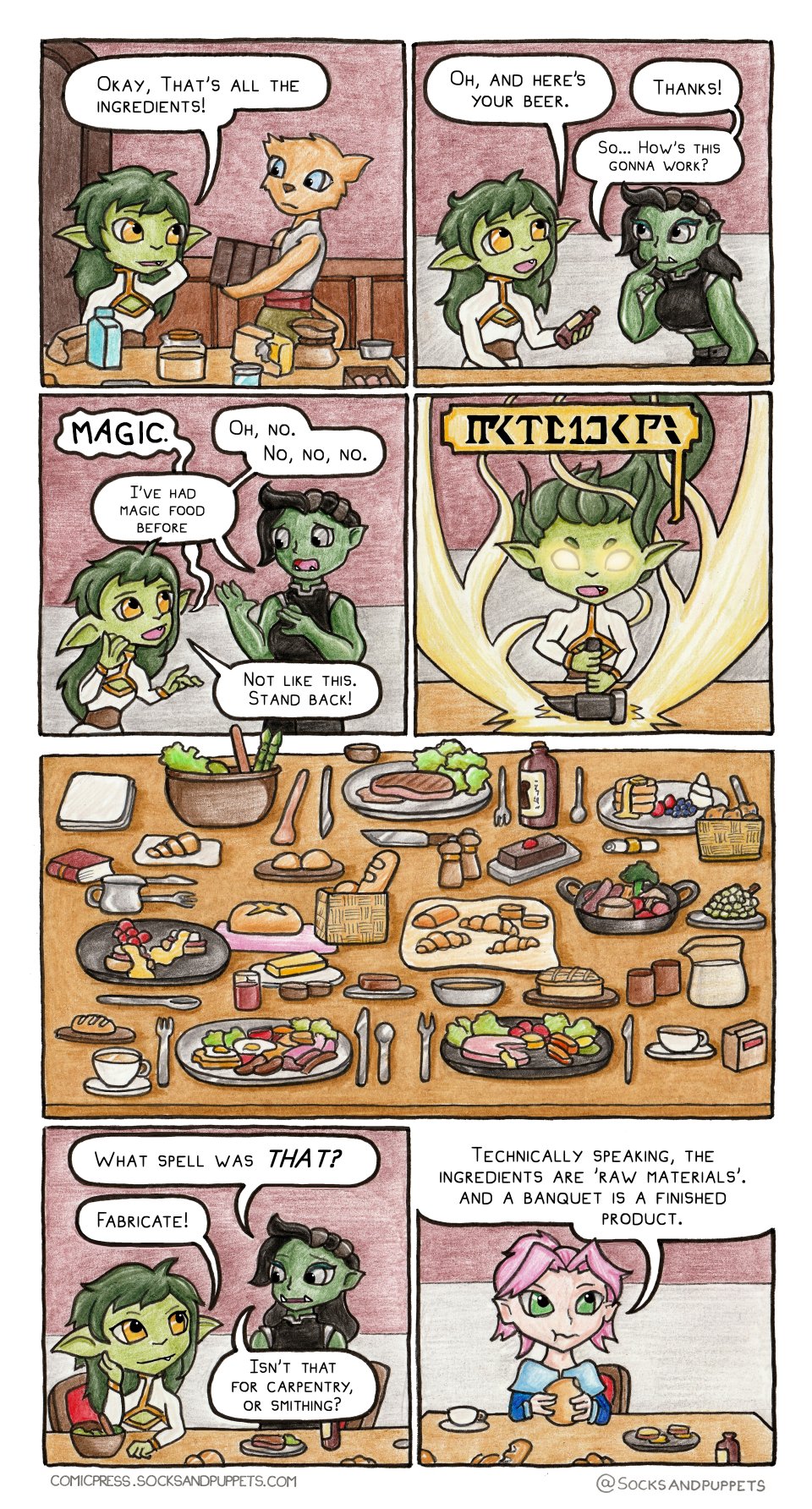this post was submitted on 24 Jan 2024
438 points (97.8% liked)
RPGMemes
11665 readers
361 users here now
Humor, jokes, memes about TTRPGs
founded 2 years ago
MODERATORS
you are viewing a single comment's thread
view the rest of the comments
view the rest of the comments

It really shouldn't be, but the game treats it as one. For example, the Cleric Forge's Channel Divinity blessing.
This is more specific than the general rule
So in the case of armor, it counts as one object even though it's not a discrete item. But unless there's something calling a feast one object, it follows these rules.
If you allow a feast, what doesn't count as "one object"?
StackExchange has an interesting observation here, with people discussing this issue. I thought it interesting, so I'm reposting it here for consideration.
The general definition of "an object" says that "a building" is not a single object, it's a structure composed of many other objects. But a "bridge" is essentially a building, commonly a structure composed of many objects - and a bridge is one of the specific examples given.
"Clothes" is also one of the examples, not "an outfit" or "a piece of clothing" just "clothes."
I think, the wording is unclear - it never specifies that you can "only" make one object, it just lists some objects you can make, and uses plurals in a bunch of places. I've always read this as "you can make as much stuff as you have raw materials for"
The other way I would think about this, is that a "feast" or a "banquet" is a conceptual "thing" composed of many parts - but I at least think of a suit of platemail the same way, being familiar with platemail. Indeed some of the objects contained within a suit of platemail are individual objects per the rules:
"A breastplate" is one object, and contained within a suit of armour "Halfplate" is a breastplate, greaves and vambraces, and that's "one object" "Full Plate" is a single object, but it contains within it as a subset, "halfplate" and halfplate contains within it "breastplate"
I don't think "a meal" is really different to this, it could be viewed as a single entry (full meals are costed as single items in the PHB) - or it could be viewed as the sum of its components.
Fundamentally, I think the spell wording is not clear. As a DM, I like to go with simplicity and clarity when making rulings. My main goal is "is this a ruling where all the players understand it with the same meaning" - will my ruling cause further arguments or let us get on with the game.
"You can use the materials to make products made from those materials" as the spell states, and just letting my players have fun with it seems very simple to rule on - do they have enough "stuff" to make the products? That determines whether or not they can do it, and it's a nice clear line that everyone can understand and agree on.
On the other hand, Once you start getting into the situation of "is this a single object or not" it gets very complicated very quickly, and players will start to argue and try to game the system in order to be able to make more stuff. Two swords? well that's two items right? What if the swords were built into a frame and attached by sprue, like model making kits? that one sheet of parts is a single item. How complex a weird single metal object can I forge to get as many different swords as possible out of it?
You allow a suit of armour but not a banquet? I shape my food into the shapes of all the pieces of a suit of armour, and make banquetmail. It's now one object... Edible clothes exist, so what if I just claim all my food objects are clothes now?
I think, the simplest answer is just to go with the simple easy ruling - but check with your DM, they might have their own ideas.
Well, again, the spell doesn't ever specify "one object". It does say "products of the same material".
DMs will rule differently, so always check what your DM thinks.
If it were my game, I'd argue that fabricate creates an object out of raw materials, with the same skill as the caster, (if I recall the text correctly, masterwork items can't be created unless the caster has the skill required to craft one). In my mind, fabricate replaces the tools and time required to create the object, but not the skill. I'd say that you could use fabricate to make a meal, even a large one, but it would not be a banquet unless the caster was also a proficient chef.
Also, I think all the items come out at room or ambient temp, you can't use fabricate to create a superheated iron sphere that sets everything nearby on fire. So the food would be "cold" in my opinion.
Does that mean you can't fabricate an ice sculpture out of ice or a snowman out of snow?
I think the "finished product" probably should be at whatever temperature we associate with that thing as a "finished product". "a pizza", for example, would be warm - assuming the caster had the skills to make a good pizza. Some objects have a temperature as part of their essence of being "that thing" and if you change them to be room temperature, then they're no longer that thing.
As for "the caster needs to be a proficient chef" we're covered. Konsi is a proficient chef. Personally, I wouldn't allow this for a caster without cook's utensils. (they could make sandwiches though)
As always, check with your DM. People are going to interpret this differently.